Hayward Field Was Nearly Ready for the 2020 Trials—Then Coronavirus Hit
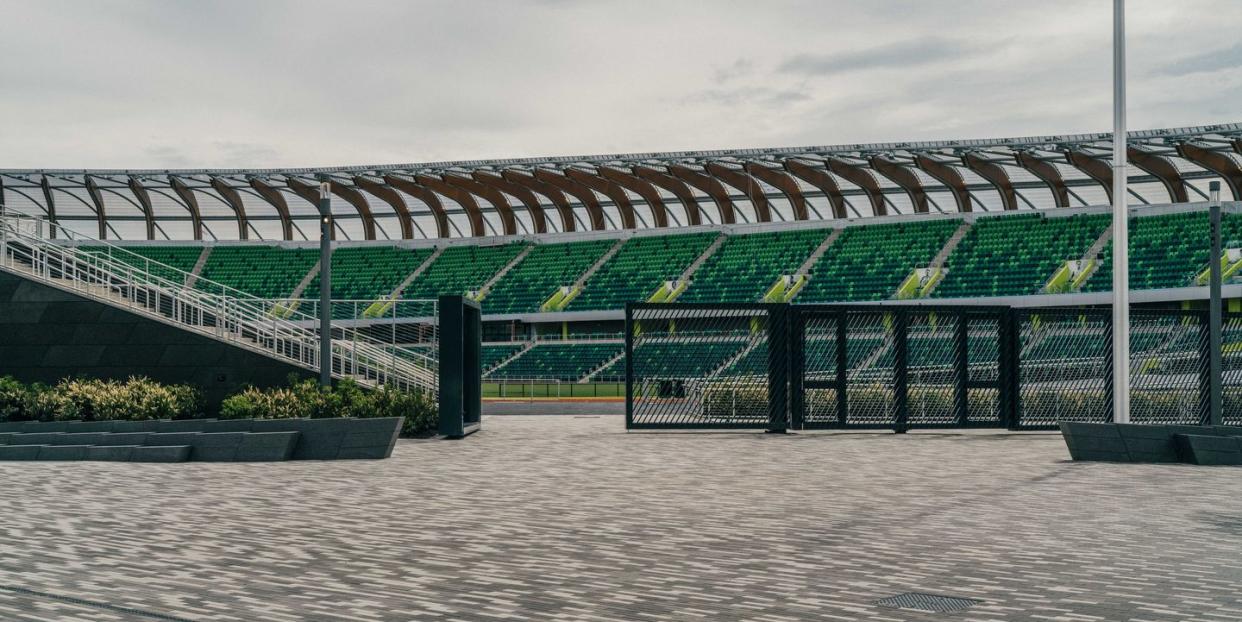
Every day, professional runners and U.S. Olympic hopefuls Sabrina Southerland and Chanelle Price get into a car and drive to a local trail for practice, passing legendary Hayward Field in Eugene, Oregon, on their way.
For nearly a century, this track and field venue—where Nike was founded in earnest as a small startup—has been the training ground for running icons ranging from Steve Prefontaine and Bill Dellinger to Bill Bowerman, among others. It was the cradle for the 1970s running boom, and for women’s efforts to expand gender equity in the sport. More recently, it’s a place where just about every elite runner has won titles or shattered goals.
Recently, Hayward has transformed from a cozy, wooden-bleacher, hand-painted edifice of green and yellow to a space-age disk, set off by a 188-foot, eight inches, silver tower—the culmination of a reportedly $200 million renovation. (“The University of Oregon has not disclosed a total cost,” a spokesman for the University said in an email.)
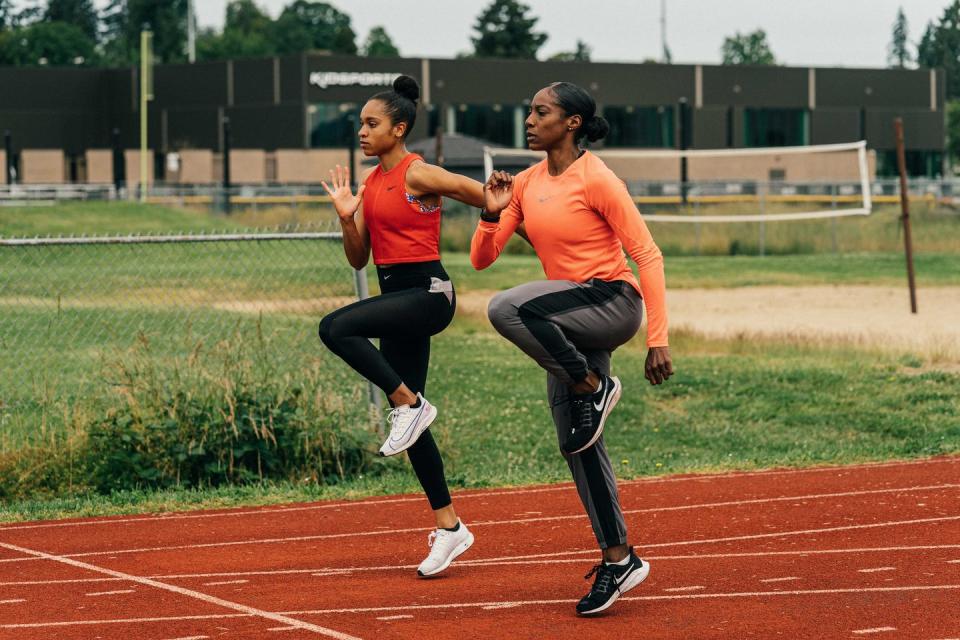
Most days, masked construction workers still buzz about, putting the final touches on the makeover, as its grand unveiling was scheduled to be this summer at the U.S. Track and Field Olympic Trials. Southerland and Price count themselves among those who slated to compete in the 800 meters.
There will be no Trials this year, nor will there be an Olympics, due to the coronavirus. For now, the Trials are postponed until 2021, concurrent with the Tokyo Games, but there’s no guarantee those will happen either.
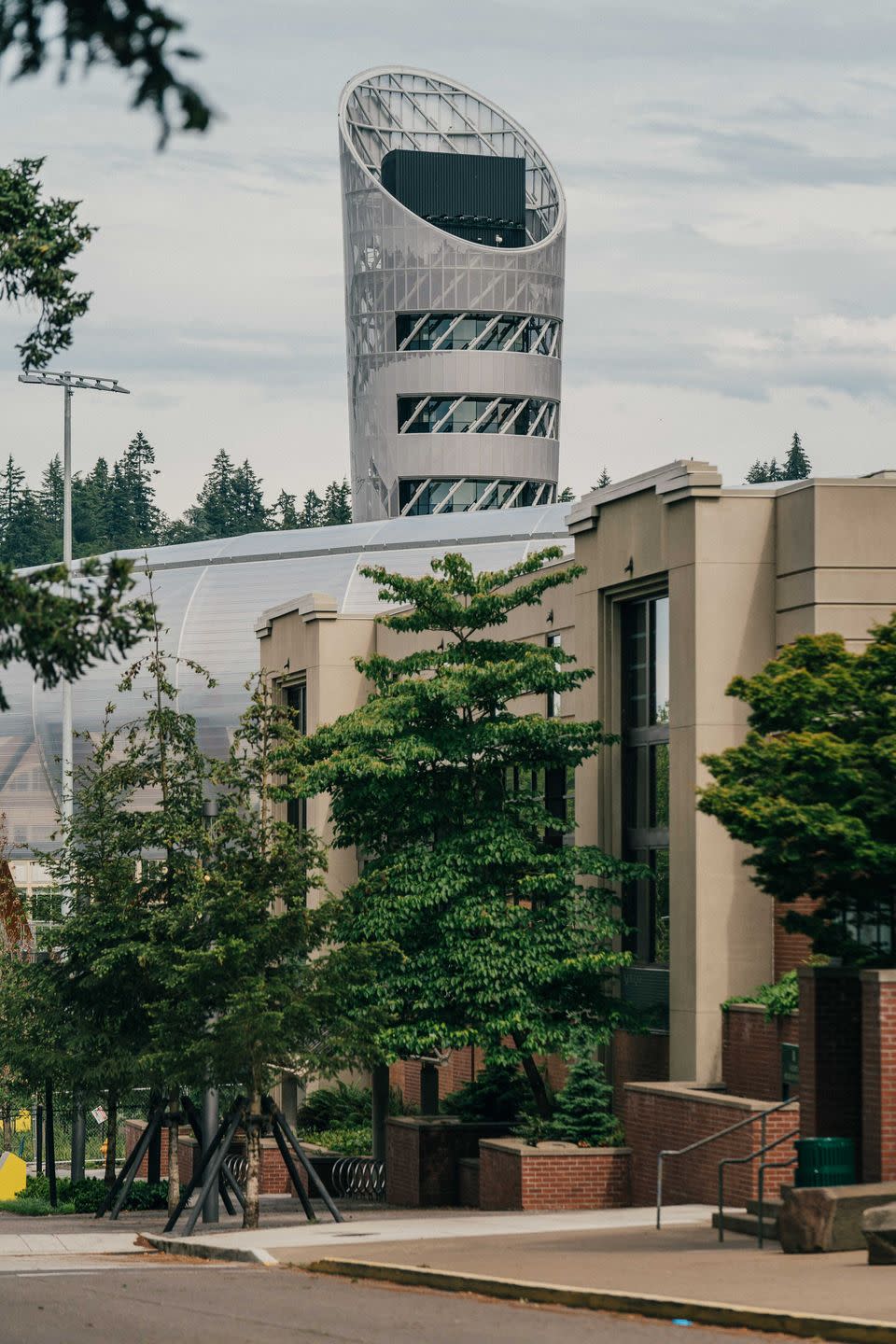
Hayward Field is a stadium built for huge, tightly-packed, excited crowds, and now it’s waiting to open at a time when politicians, doctors, and fans couldn’t be less interested in social closeness. No one, including the architects of Hayward, could have predicted the impact of COVID-19. Organizers are among those around the world trying to solve the puzzle of making crowd-filled stadiums function in the coronavirus era.
As of the originally scheduled start date of the Trials on June 19, more than 115,000 Americans have died due to coronavirus. It’s a number that most struggle to wrap their heads around as it is eleven times the capacity of Hayward Field before its renovation (10,500). But it’s not just a number—it’s parents, siblings, children, friends, and beyond, a mass trauma in an ongoing narrative.
Although the Pacific Northwest was the epicenter of the early stages of the pandemic, it fueled parts of the sparsely populated state to shut down earlier and more dramatically, taking cues from Washington to the north and California to the south. It has remained thankfully low in terms of casualties, compared to the rest of the U.S., and largely out of Eugene.
Elite runners are the first to admit that in the shadow of such losses, a missing track season or Olympic dream feels relatively hollow. But to the athletes, the fans, and the community of Eugene, the postponement has already had literal and emotional cost. Much has been said, and will be said, about the impact of the postponements (or possible cancellations) of the NBA season, MLB season, or even the Tokyo Olympics. And in Eugene, it’s not just the loss of track and field, but also the potential loss (or downscaling) of University of Oregon sports; the women’s basketball team, boasting the WNBA’s number-one draft pick in Sabrina Ionescu, had its season cut short due to the virus, and the Duck football team, coming off a Rose Bowl title, may not get a chance to pack Autzen Stadium in the fall.
For now, many wonder—what happens to a small town that had so much riding on a track season?
With its uncertain opening date and unfortunately-timed renovation, given the coronavirus, Hayward Field has become a complicated symbol of tradition, anticipation, sadness, controversy, and hope in the Pacific Northwest community that has proudly staked its claim as the historic, and potentially future, center of track and field in America.
The devastation of the Trials cancellation in Eugene is primarily moral and economic. Although the city has a population of 172,000 people, it has a disproportionately large investment in the sport of running. Located a two-hour drive south from Portland, Eugene’s streets are lined with banners and murals of local running icons—Prefontaine, Bowerman, and more recently, Oregon native Galen Rupp, who is among the few American athletes to have already secured an Olympic berth, as the U.S. marathon trials took place in February in Atlanta. It’s one of the few places in the country where a 10k race can not only sell out, but bring fans to their feet screaming with Super Bowl-level gusto. Most sports fans don’t know what a decathlon is, but the face of Ashton Eaton, the Oregon-bred two-time Olympic gold medalist in the event, is emblazoned on the new Hayward tower.
“[Track] is a very important part of our economy,” Eugene mayor Lucy Vinis says in an interview with Runner’s World. “But it’s part of our culture. We’re a track community. We have bark trails, trails everywhere, a legacy of star athletes and coaches. It’s fundamental to our community. We’re serious track fans in our community and are proud of our role.”
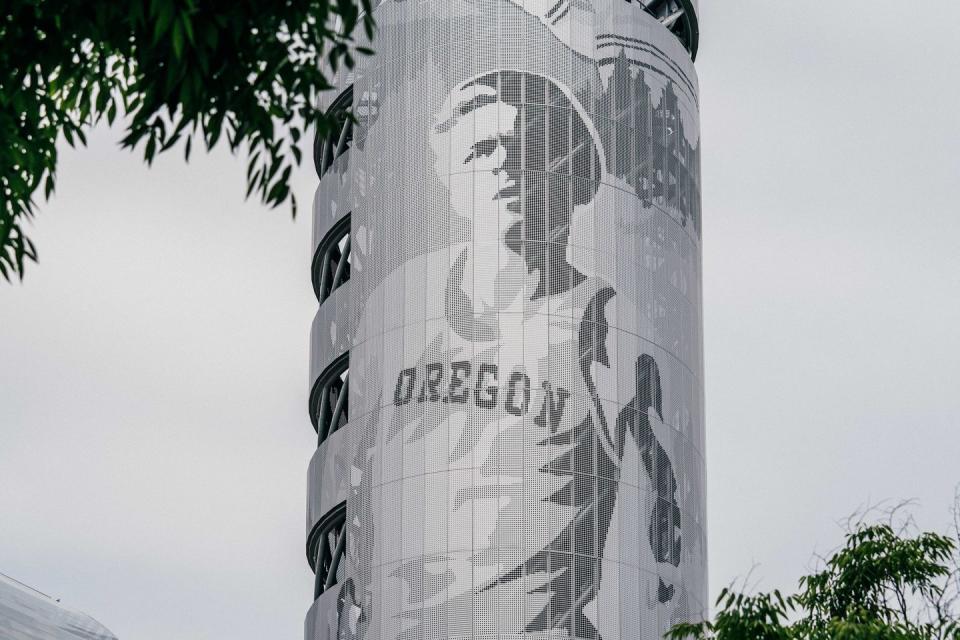
Eugene hosts myriad meets—the NCAA and PAC-12 championships, the World Junior Championships, the Prefontaine Classic, and the Olympic Trials—and is scheduled to host the outdoor IAAF Track and Field Championships in 2021 (a decision that is currently under investigation by the U.S. Department of Justice). The normally quiet town becomes a boom around the Trials, with many locals relying on a surge of income ranging from tips at restaurants to Airbnb fees. The 2016 Trials brought 177,000 people over eight days—about the size of the city’s entire population.
In 2016, the economic impact of the Trials was estimated to be $37 million, Vinis says, citing estimates from a local visitor’s bureau. In 2015, the bureau estimated that the average Oregon football home game brought in $5.8 million, a number given higher attendance and the team’s success in recent years is likely a low estimate. “We’re postponing that revenue by a year,” Vinis says, of the Trials numbers. “That’s big.”
From 2008 to ’16, meets hosted at Hayward made more than $173 million, she says, and the city estimated that the World Championships could bring in $52 million in direct spending.

Long before coronavirus hit, concerns about income inequality have loomed in Eugene. While the University of Oregon’s campus brims with ambitious, Phil Knight-funded construction, one in five people in town live below the federal poverty line, roughly double the national level. The lumber industry that once boomed in Eugene has stagnated for years, and may decline further due to the coronavirus. Eugene and many of its surrounding communities have, for decades, suffered from higher-than-average homelessness, and methamphetamine and opioid addiction. The unemployment rate in Oregon jumped to 14.2 percent in April from 3.3 percent in March, among the biggest spikes in the state’s history, closely in line with the numbers nationwide.
Locals had complained about the financial hit when Hayward closed in June 2018 for renovation and saw construction delays before COVID-19 became a global pandemic. Yet Vinis is among those with her fingers crossed that curves are flattened, testing spreads and scientists deem it safe for thousands of athletes to converge in a single location, perhaps without sold-out stands.
“It’s a huge commitment on the part of the community, the region, the University of Oregon,” T. Bettina Cornwell, a professor of marketing at the University of Oregon’s Lundquist College of Business, says. “I have no idea about how the recovery can go.”
And in some respects, it’s out of the hands of track officials, as the fate of the Tokyo Games determines whether or not there will even be the need to field a U.S. Olympic team.
Michael Reilly, the chief executive of TrackTown USA, the nonprofit that stages the event, said his team is mapping out a variety of possible plotlines.

“What does it take to have the Trials if the world is normal?” Reilly says. “That’s the best understanding to get people in and out, what do the athletes need? Hospitality and warm up areas? They all need to be in place. Then, I think you build the other scenarios for what the world might be like. What will it be like at 20 percent, 40 percent capacity? If new safety regulations require this type of cleaning, to insure everybody is wearing a mask? All of those protocols are still being developed and I’m sure they will continue to be developed as other sports and events develop their scenarios.”
Ticket sales are currently on pause, and Reilly and his staff are working to issue ticket refunds or transfers to next year’s dates. It’s unclear if fans will be permitted. Thankfully, many of their largest contracts—such as those with food and beverage vendors, security, and so on—had yet to be signed, he says.
And if the Olympics are canceled altogether, he added, “We’re trying as best as possible to live in the real world. We understand that’s possible but it’s on a list of possible scenarios. ... The world is moving fast and everything is speculative and predictive, our job is to make sure we’re here to help athletes chase their Olympic dreams.”
That leaves Southerland, Price, and others in Eugene reckoning with the ambiguous loss, wondering if their shot at making an Olympic team will ever happen. Southerland, 24, who won an NCAA indoor title in the 800 meters in 2018, and Price, 29, who won the 800 meters at the World Indoor Championships in 2014, were both among the contenders to make the team in the event. Southerland and Price had moved to Eugene from Arizona and Queens, New York, respectively, to best prepare for a shot at making their first Olympic teams as part of the Nike-funded Oregon Track Club Elite team.
“‘Oh God, everything I ever worked for is going down the drain.’ That’s how I felt initially,” Southerland says of the postponement news.
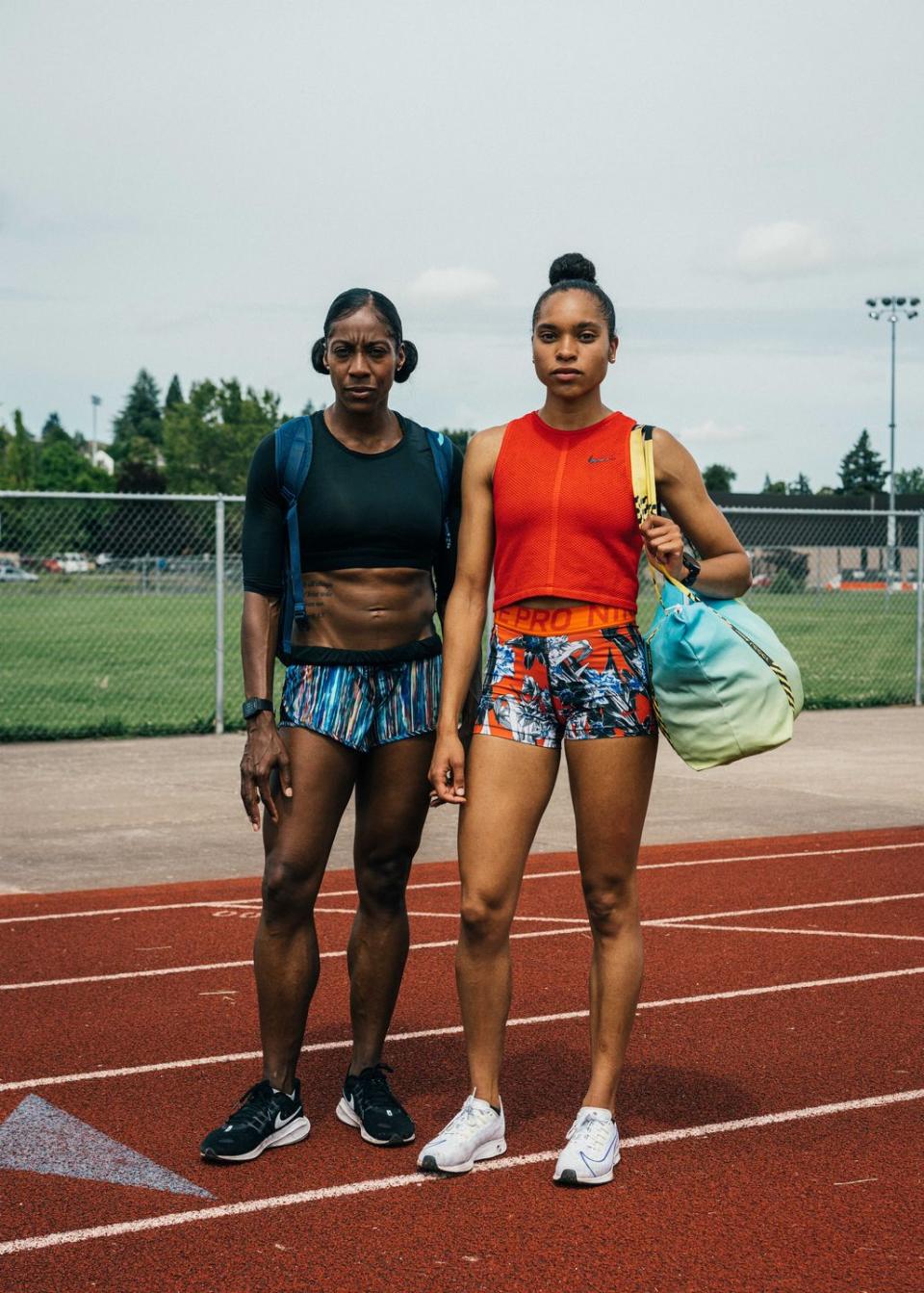
As roommates, they’re sheltering in place together, and they share a makeshift gym at their house, following workouts emailed to them by their coach. They consider themselves grateful that high school tracks and local trails were not closed, thus allowing them to continue to train daily while many runners have seen their facilities shut down. They train to maintain overall fitness and stay busy, but it’s unclear what, exactly, they’re training for, or when.
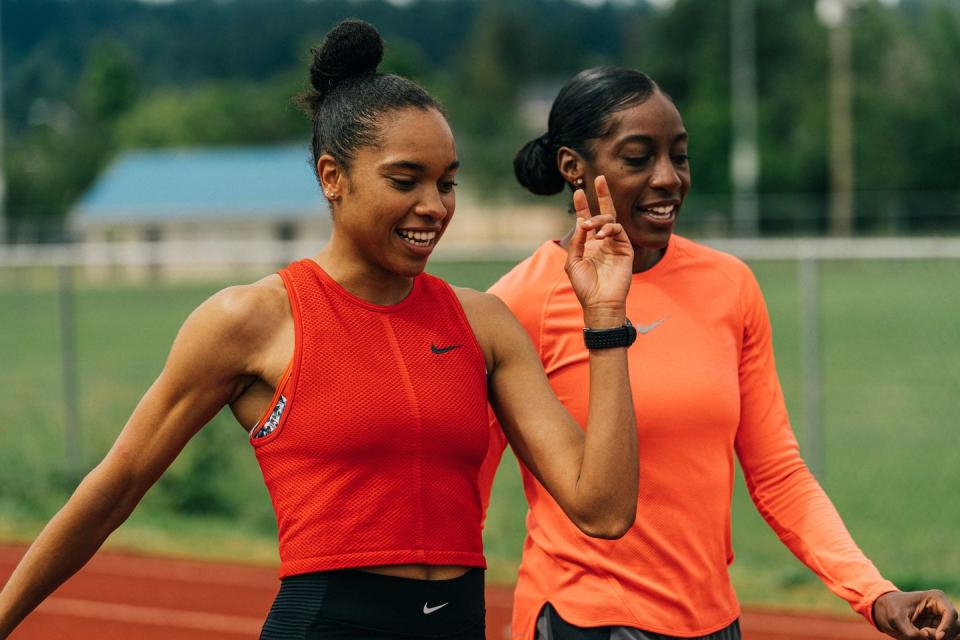
“I was definitely pretty disappointed,” Price says of the postponement news. “I almost felt bad for being disappointed because at the end of the day, this is bigger than sports.”
If and when sports come back, it’s unclear if there will be fans—a path recently taken by the U.S. Tennis Association in staging its return—which could deepen the already devastating economic fallout in the Eugene community.
For now, the area is in a holding pattern. But tension remains high; this already-exhausting pause brought on by COVID-19 feels like just mile two of the marathon, rather than the finish line.
Consider beer.
Falling Sky Brewery, makers of the Long Distance Lager, has three outposts in town, including a 125-seat location 500 feet from Hayward on the University of Oregon campus. The breweries were gearing up for heavy Trials traffic, Rob Cohen, the brewery’s owner, says. Unlike the visitors for University of Oregon home football games, track tourists typically spend more time lingering around town and exploring, meaning more sales of locally-sourced sausages and brews. What’s worse, there was already a lag in track fan income due to Hayward’s closure last year for the renovation; the Trials were supposed to make things better.
“We live in little Eugene, so you can only imagine how big of an impact hosting the Olympic Trials can be,” he says. Cohen, who lives three blocks from Hayward Field, can hear the construction from his backyard. “We’ve been gearing up all year!”
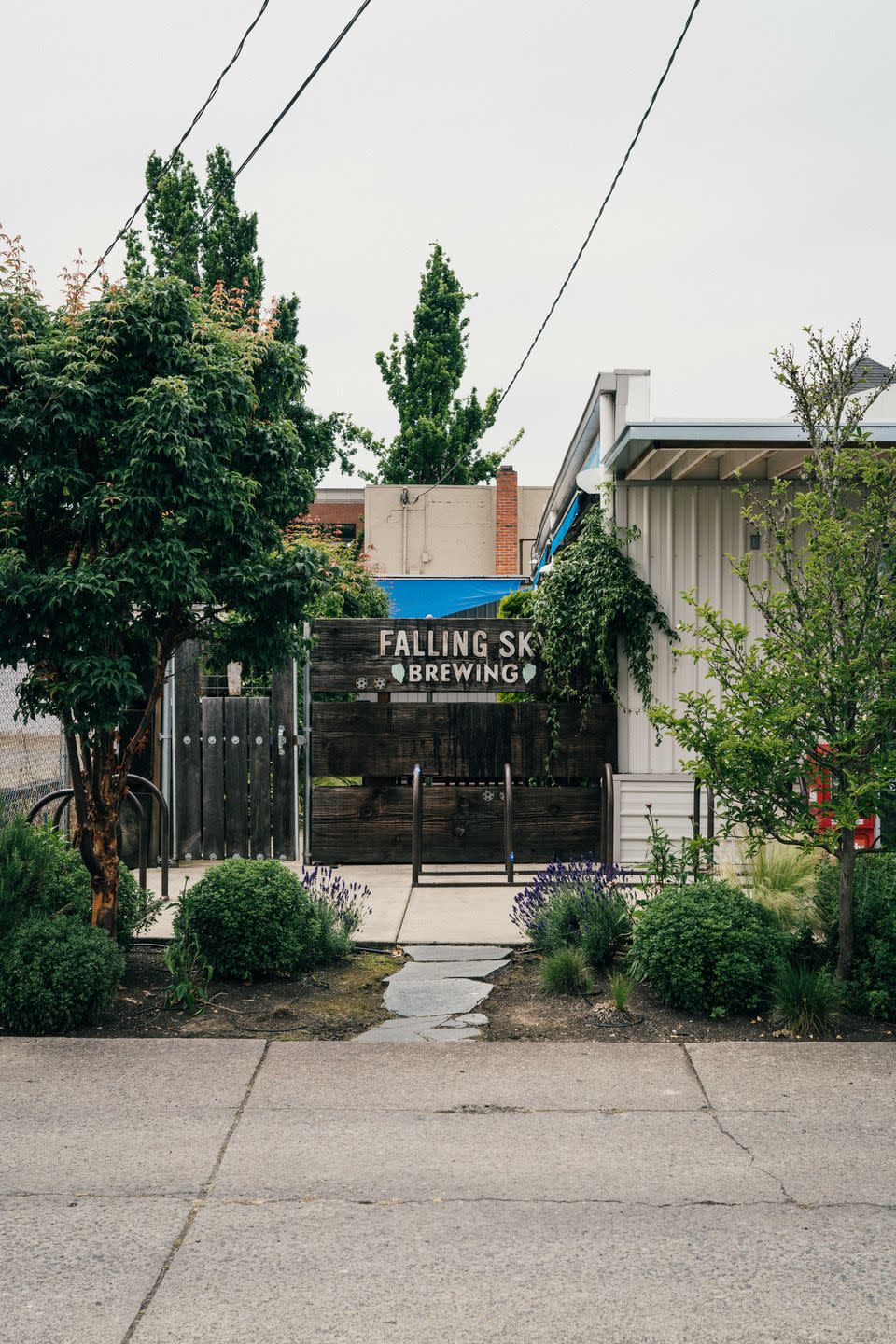
On March 15, Falling Sky closed its doors per Oregon governor Kate Brown’s orders. On May 1, Cohen reopened one location for takeout orders. The Oregon Liquor Control Commission moved to waive fees and to rapidly allow breweries and pubs to deliver beer, wine and cider, helping create an additional revenue stream. Still, Cohen estimates that Falling Sky is earning about 15 percent overall of its normal cash flow this time of year and about 35 percent at its location that is open. The company received a Paycheck Protection Program loan, but said that it may not be enough to keep him afloat in the long term.
The postponement of Trials, he says, “is a major disappointment.” In his 25 years in the beer and restaurant industry, recessions are typically good for business, especially in a college town.
“People want to drink when they’re really happy and really sad,” he says. “But when you add in the pandemic and restaurants being seen as petri dishes for the virus, obviously it makes it a lot harder. I’m really concerned. I wouldn’t bring my family out to a restaurant right now. I don’t see people coming back in a long time.”
He added, “There are so many unknowns. We’re not sure what will happen next year and unknowns are hard to plan for. It’s a great big question mark for us. To survive is more immediate. I don’t see how many businesses like us can make it at 30 percent.”
Lodging, once at a shortage for the Olympic Trials, has turned into a glut of empty rooms. Many hotels, including the recently remodeled Graduate Hotel downtown that was slated to be a hub for athletes and coaches, remained shuttered through the spring and only now are gradually reopening. For those that are open, tourism has remained largely at a standstill, particularly for any travelers coming out of state.
The Excelsior Inn, a boutique hotel and restaurant on campus that has catered to track and field tourists since owner Maurizio Paparo renovated it in 1993, had its summer rooms completely booked from spring through summer, largely tied to track events. “It was on track to be our best year out of 27,” he says.
On March 17, he was ordered to close and had to cancel two months of reservations—many rescheduled for 2021. The restaurant re-opened partially as part of the county’s phase two rollout, which started June 5, but Paparo still applied for a government loan in the interim.
“That’s the reality now,” he says. “The whole idea was to buy time, but the virus is still out there. We haven’t killed the virus. We killed the economy. We killed social engagement. But the virus is still alive.”
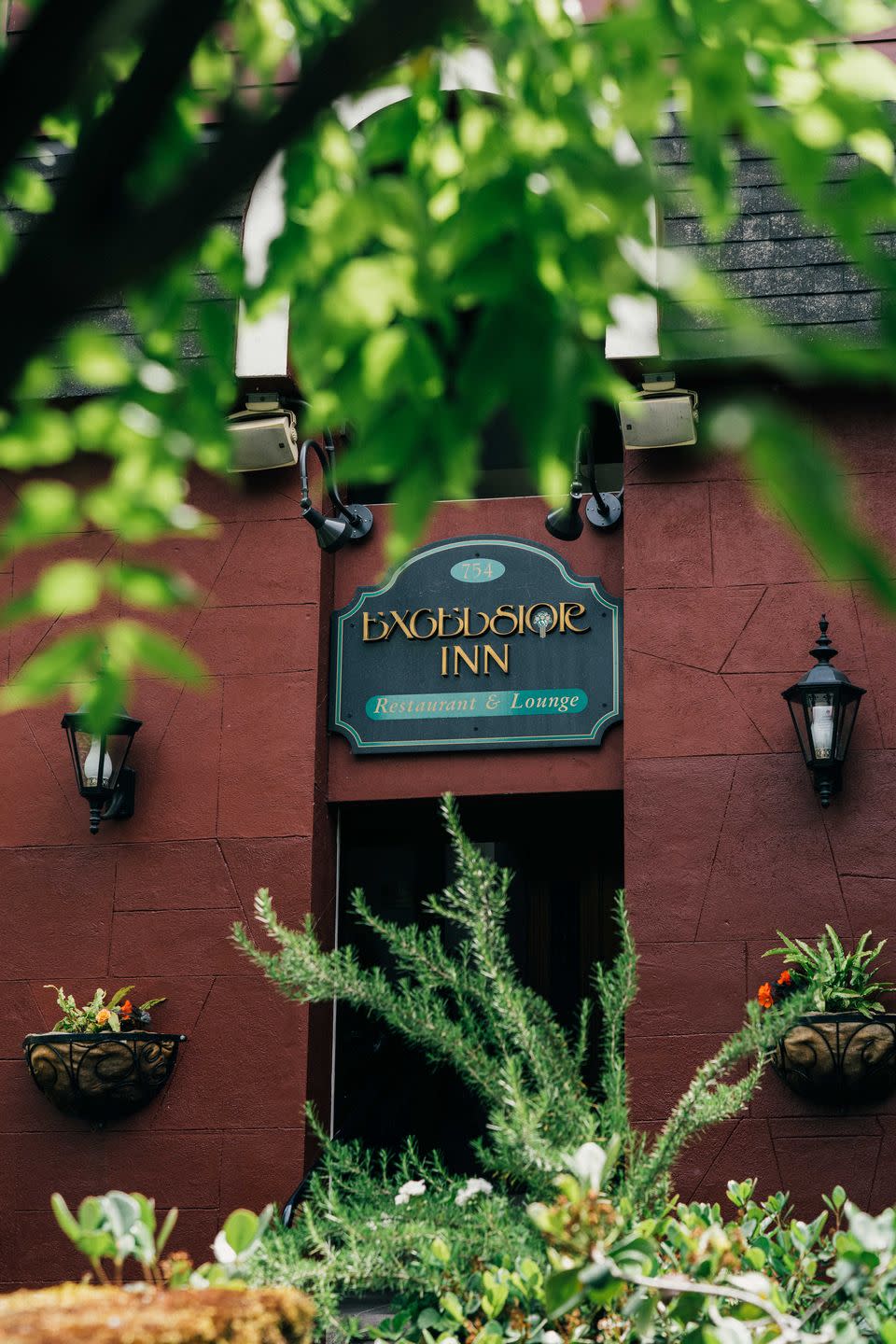
Running stores typically thrive in zip codes with high average incomes, yet Eugene, where the median household income is $49,000, compared with $63,000 nationally, supports several. Among them is Run Hub Northwest, which had sales and a slate of events planned for Trials, owner and co-founder Dustin Pearce, says. The Trials can bring anywhere from an extra $50,000 to $100,000 in additional sales, Pearce says. Extra support staff has not been hired.
Run Hub swiftly moved to cancel all of its events, including events with its popular spring training team and a block party. They raced to create an online storefront and closed their location downtown. Pierce has furloughed some of his staff and now has a pickup table staged outside with limited hours. At least one of his staff members was chasing a qualifying time himself to run in the Trials, a quest also on hold. “All those things we were working for,” he says, “We’re going to work for them next year.”
Less visible will be the loss in hotel taxes, income tax from those working in or around the events, fees from sources such as parking, and other adjacent revenue streams. Mayor Vinis says that the town estimates at least 12 to 24 months for economic recovery in the community due to the coronavirus, including the postponement of the Trials.
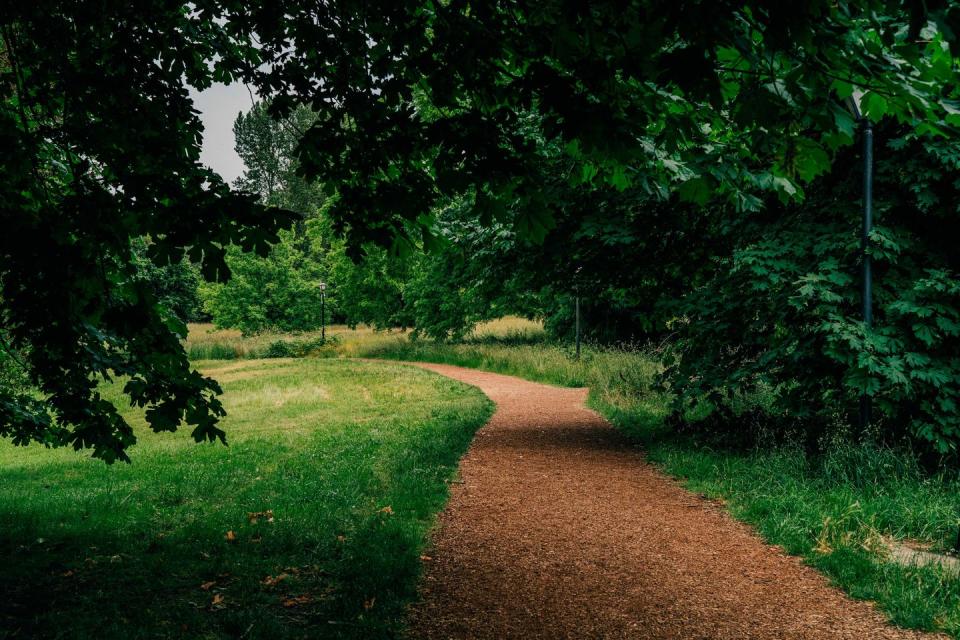
“It’s a love-hate thing because when times are good, it’s great to be a company town,” Mark Conrad, a professor of law and ethics at Fordham University’s Gabelli School of Business, says. “But when times are not good, it’s different.” He points to Youngstown, Ohio, the longtime home of U.S. Steel. “The economy was great there, post-World War II. But when things turn bad, the company moves out, the community is left holding the bag. It’s high-risk, high-reward.”
Even in a town “diversified” with its portfolio of sports investments—from college sports and track events to the town’s own marathon—coronavirus has put all of that up in the air, as well.
“Certainly for civic pride in Eugene, that’s affected,” Conrad says. “When you have to look at an empty stadium, it lays bare the events that aren’t taking place.”
As of mid-June, Gov. Brown had approved Lane County for Phase 2 reopening. In Phase 1, Eugene residents saw restaurants open for socially-distant seating, hair salons with restrictions and local gatherings up to 25 people with no traveling. Phase 2 rolled out pools, movie theaters, bowling alleys and expanded hours for bars and restaurants. It’s a story playing out globally; the tension between protecting public health and the relief of some semblance of normal life and a forward-moving economy. Many businesses will stay closed forever.
Back near Hayward Field, Southerland and Price are remaining optimistic. They said that they’re recognized in town, and they receive smiles and waves when they’re trotting along the local trails at a social distance.
Both of Southerland’s parents back in New York work at hospitals, her mother as a respiratory therapist and her father as a radiologist. Her calls back home have been “a reality check,” she says.
“I’m just trying to stay patient. That’s all you really can do.”
So, she and Price run, lift, stretch, and continue to cheer for each other. Eugene’s parks and running trails have remained open, and Vinis has encouraged locals to turn to running as a socially-distant, safe way to stay healthy during the pandemic, elites and otherwise.
When the Trials and competitive racing do come back, “It will mean more,” Southerland says. “Missing out on track meets, working out with your coach and this other stuff, we take it for granted sometimes. It just reminds me how privileged we are. I think we’ll appreciate seeing other people and it will definitely be worth it.”
And, until then, when practice is done, the pair will get back in their car and make their way back home past an empty Hayward Field—for now.
You Might Also Like

